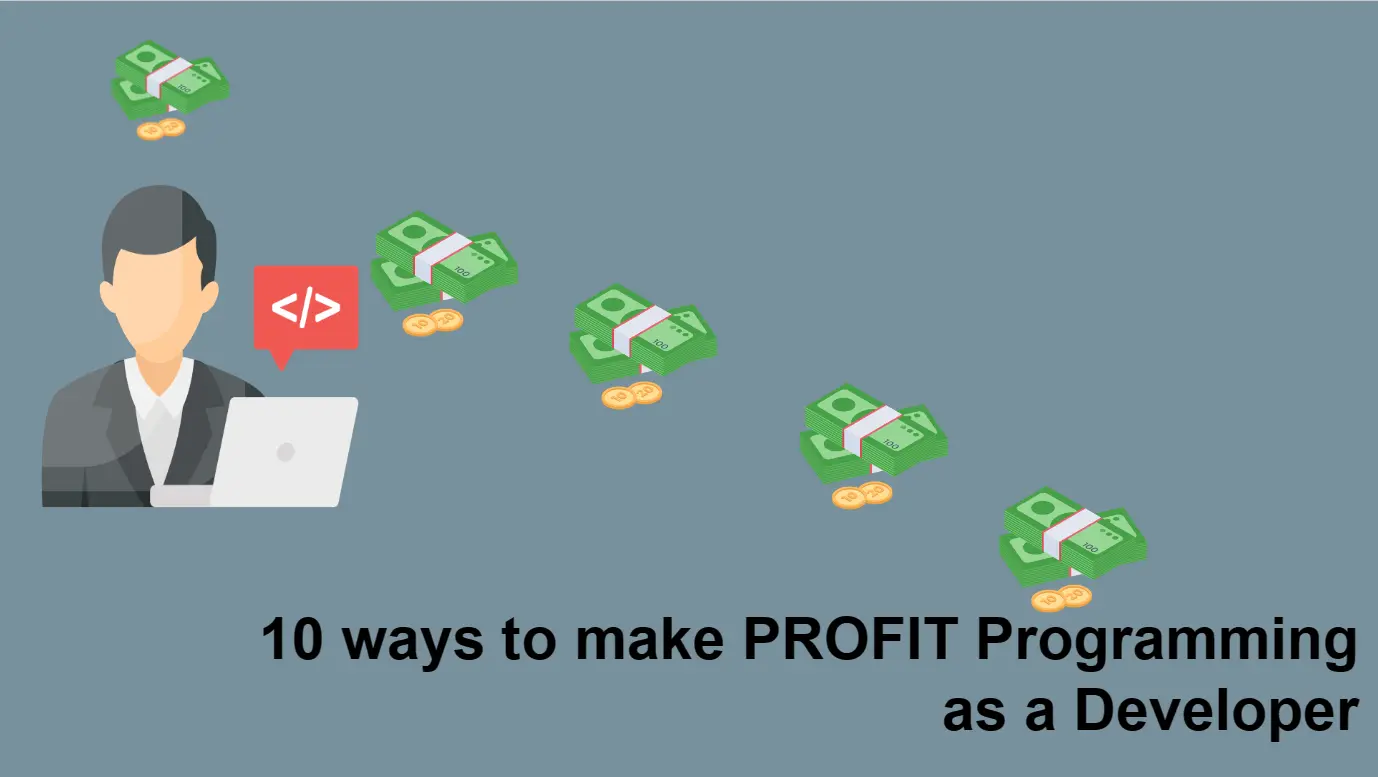Make Profit Programming: Making Ways For Developers

Making profit programming as developers is an achievable goal with the right strategies and mindset. There are many ways to monetize your programming skills and knowledge, such as creating and selling your own software products, offering freelance programming services, or contributing to open-source projects
To succeed in this field, it's important to stay up-to-date with the latest programming languages, frameworks, and tools, and to continually improve your technical abilities.
Additionally, building a strong personal brand, networking with other developers and potential clients, and mastering effective marketing techniques can help you stand out from the competition and increase your profitability.
With dedication and persistence, you can turn your passion for programming into a lucrative and rewarding career.
Developing and Selling Software Applications as Developers
Developing and selling software applications has become a booming industry in recent years, as businesses and individuals increasingly rely on technology to streamline their operations and improve their lives.
Whether you're creating productivity tools, entertainment software, or innovative solutions to complex problems, the market for software applications is vast and diverse. However, success in this industry requires not only technical expertise, but also marketing savvy and a deep understanding of your target audience.
By creating a great product, optimizing your website for search engines, and effectively promoting your software, you can build a profitable business and make a meaningful impact in the world of technology.
Offering Programming Services as a Freelancer for Developers
Offering programming services as a freelancer can be a rewarding and lucrative career choice for those with technical expertise and an entrepreneurial spirit. As a freelance programmer, you have the freedom to choose your own projects, set your own rates, and work on your own terms.
However, success in this field requires more than just technical skills. To attract clients and build a successful freelance business, you must also have strong communication skills, business acumen, and a deep understanding of your target audience's needs and preferences.
Additionally, building a strong personal brand, networking with potential clients and industry peers, and mastering effective marketing techniques can help you stand out from the competition and increase your visibility in the marketplace. With the right strategies and dedication, offering programming services as a freelancer can provide a fulfilling and profitable career path.
Creating and Selling Online Courses
Creating and selling online courses has become an increasingly popular way for individuals and businesses to share their knowledge and expertise with others while generating income. With the rise of e-learning platforms and advancements in technology, creating and delivering high-quality courses has never been easier.
However, competition in the online course market is also increasing, making it important to create courses that stand out and provide value to learners. Successful course creation involves identifying a target audience, developing engaging content, and utilizing effective marketing strategies to promote the course and attract learners.
Building a Portfolio of Work

Building a portfolio of work is a crucial step for individuals looking to showcase their skills and expertise in a particular field. A portfolio is a collection of projects, assignments, or other works that demonstrate an individual's abilities and strengths. It allows potential clients, employers, or collaborators to evaluate their work and make informed decisions about their suitability for a particular job or project.
A well-designed portfolio can help individuals stand out in a competitive job market and demonstrate their unique abilities and creativity. Building a portfolio involves selecting relevant works, organizing them in a cohesive manner, and presenting them in a way that effectively communicates one's skills and experience.
Developing and Selling Plugins or Add-ons
Developing and selling plugins or add-ons is a lucrative business opportunity for software developers and entrepreneurs. Plugins and add-ons are software components that add specific features and functionalities to existing applications or platforms, such as web browsers, content management systems, or e-commerce platforms. The increasing demand for customized software solutions has created a growing market for these types of products.
Developing and selling plugins or add-ons require a deep understanding of the target platform and its user base, as well as expertise in software development and marketing.
Successful developers must identify a gap or a need in the market and create high-quality products that meet the requirements of their target audience. Effective marketing strategies, such as product demonstrations and reviews, can help attract potential customers and increase sales.
Offering Consulting Services
Offering consulting services is a viable and rewarding career path for individuals with specialized knowledge and expertise in a particular field. Consulting services provide professional advice and guidance to clients seeking to improve their business performance, solve problems, or make strategic decisions.
Consulting services can be offered in a wide range of industries, such as management, finance, human resources, marketing, and technology. Successful consultants must possess excellent analytical and problem-solving skills, the ability to communicate effectively with clients, and a deep understanding of their clients' needs and goals.
Offering consulting services requires a well-defined business plan, including market research, pricing strategies, and a clear value proposition. Building a strong reputation and developing long-term relationships with clients are essential to establishing a successful consulting business.
Participating in Hackathons and Competitions
Participating in hackathons and competitions can be a valuable and rewarding experience for individuals looking to showcase their skills, network with other professionals, and gain recognition in their field. Here are four reasons why participating in hackathons and competitions can be beneficial:
- Skill Development: Hackathons and competitions provide opportunities to develop and showcase one's technical and problem-solving skills. Participants are often tasked with solving complex challenges and developing innovative solutions within a limited timeframe, which can help improve their abilities in a high-pressure environment.
- Networking: Hackathons and competitions provide opportunities to meet and collaborate with other professionals in the industry. Participants can network with potential employers, mentors, and peers, expanding their professional network and gaining valuable contacts.
- Recognition: Hackathons and competitions often provide opportunities for participants to showcase their work and gain recognition in their field. Winning a competition or receiving recognition for one's work can lead to increased visibility and opportunities for future projects or job offers.
- Innovation: Hackathons and competitions encourage participants to think creatively and come up with innovative solutions to complex problems. This can lead to the development of new technologies, products, or services that can make a positive impact on society and drive progress in various fields.
Crowdfunding for Software Projects.
Crowdfunding has emerged as a popular and effective way to finance software development projects. Crowdfunding involves raising funds from a large number of individuals, typically through an online platform, to support a specific project or cause. For software development projects, crowdfunding can provide an alternative to traditional funding methods, such as venture capital or bank loans, and allow developers to retain more control over their project.
Crowdfunding for software projects also provides an opportunity for developers to test their ideas and gauge public interest in their product before investing significant resources into development.
Crowdfunding platforms often provide additional benefits, such as exposure to a large audience, access to valuable feedback and mentorship, and opportunities for partnerships and collaborations.
However, launching a successful crowdfunding campaign for a software project requires careful planning, a well-defined project plan, and effective marketing strategies to attract and retain backers.
Monetizing Open-Source Projects.
Monetizing open-source projects is a growing trend among developers and entrepreneurs looking to build sustainable businesses around their software projects. Open-source software is software that is free to use, modify, and distribute, but that doesn't necessarily mean that there are no opportunities to generate revenue.
Monetizing open-source projects can involve a range of strategies, such as offering paid support services, selling add-ons and plugins, providing consulting or training services, or using a dual-licensing model that allows commercial use of the software for a fee.
Monetizing open-source projects requires a deep understanding of the target audience, a clear value proposition, and effective marketing and distribution strategies. Successful developers must balance the desire to maintain the openness and accessibility of their software with the need to generate revenue and build a sustainable business model.
Creating and Selling Templates or Themes.
Creating and selling templates or themes is a popular and lucrative business model for designers and developers. Templates and themes provide pre-designed layouts and designs that can be customized and used by individuals or businesses for their websites or digital products. Creating and selling templates or themes can be a passive income stream, as once the initial design work is done, the products can be sold repeatedly with minimal additional effort.
To be successful in this business, designers and developers must have a deep understanding of the market demand, and create high-quality templates or themes that meet the needs of their target audience. They must also have a clear pricing strategy and a strong marketing plan to reach potential customers.
Finally, providing excellent customer support and offering regular updates and improvements to the products can help build a loyal customer base and ensure continued success in this competitive market.
Conclusion
There are numerous opportunities for developers to make a profit programming, whether it be through developing and selling software, creating and selling templates or themes, offering consulting services, or participating in hackathons and competitions. With the increasing demand for technology and digital solutions, the potential for profit is high, and developers can leverage their skills and expertise to create sustainable businesses.
However, it is important for developers to carefully consider their target audience, develop high-quality products and services, and have a solid marketing and distribution strategy in place to ensure success.
Ultimately, by staying up to date with industry trends, developing in-demand skills, and actively seeking out new opportunities, developers can create profitable careers and businesses in the ever-growing tech industry.